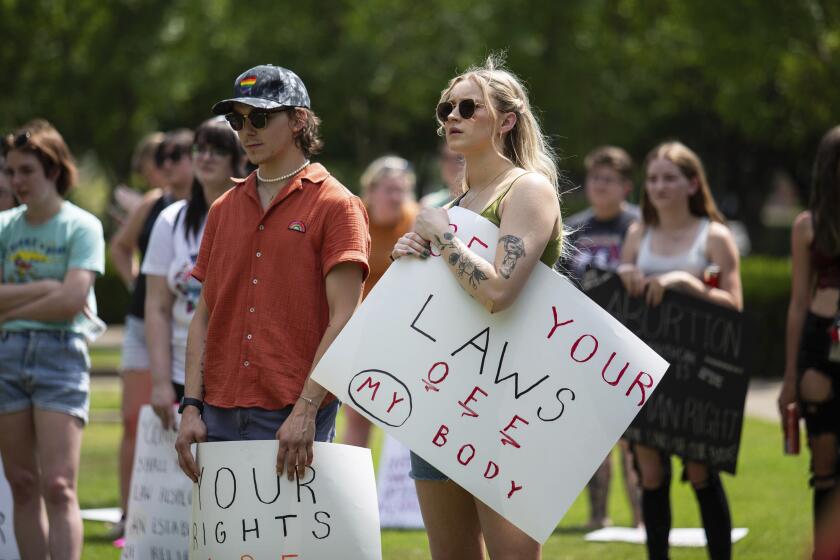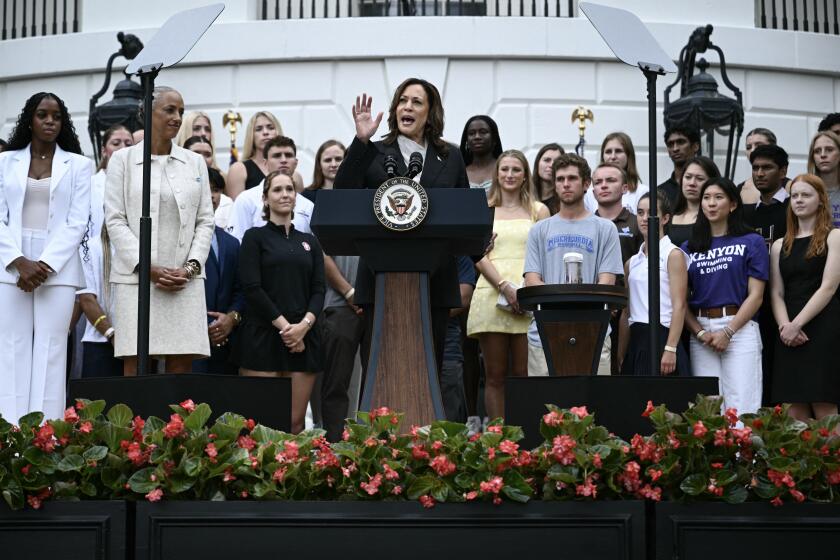Editorial: L.A. City Atty. Feuer makes valid case for funding under Prop. 47

Proposition 47, adopted last month, turned six drug possession and low-level property felonies into misdemeanors, setting in motion some rejiggering of California’s criminal justice system. Among the changes in Los Angeles is the transfer of caseloads among jurisdictions: Many crimes formerly prosecuted by county Dist. Atty. Jackie Lacey, who handles mostly felonies, will now go to City Atty. Mike Feuer, who deals mostly with misdemeanors.
Feuer’s office expects to review 13,500 new criminal cases each year and to pursue about 8,800 of them. He has asked the City Council and Mayor Eric Garcetti for a midyear budget allocation of $510,482 to hire eight new prosecutors and seven support staffers. Going forward, the annual cost is expected to be $875,164.
The mayor and the council should grant the request, and quickly.
Such budget requests cannot, of course, be taken lightly. The city of L.A. is just emerging from a severe fiscal crisis and had to cut services and lop employees from the payroll (among the hardest hit, in fact, was the city attorney’s office, which had about 300 criminal prosecutors five years ago but only 191 when Feuer took office last year). Every department and program wants funding and staffing restored and has plans for new spending, and most of those plans could be justified, if only there were enough money to go around. There’s not. But there are good reasons to grant the city attorney’s request.
One of the biggest misunderstandings about Proposition 47 is that it reduced punishments for some crimes to “a slap on the wrist” and that it even eliminated criminal sanctions altogether for drug possession. It did not. All the crimes covered remain crimes, and as misdemeanors they are punishable by sentences of up to a year in jail.
Many observers brush off misdemeanor convictions as unimportant because shorter sentences are too often not served at all due to jail crowding. But that’s part of what Proposition 47 is meant to fix. Thousands of inmates who formerly would have served multiyear terms in state prison are now serving that time in county jail cells because of the 2011 realignment law. Some of those will now see their sentences shortened, freeing up cells to allow each inmate to serve closer to his or her full sentence, while also relieving crowding in state prisons.
There is a discussion to be had about whether possession of some drugs should even be a misdemeanor, rather than an infraction such as marijuana possession, or even a crime at all — but Proposition 47 was not that discussion.
In the meantime, if misdemeanors — especially property crimes — are to be dealt with effectively, city attorneys in Los Angeles and elsewhere must have the resources to prosecute them. The crimes will continue to be committed and the police will continue to make their arrests. Prosecutors must continue to prosecute if the ballot measure is to work as intended.
Proposition 47 is expected to produce substantial savings, and some critics argued that a portion of that should go to cities to pay for exactly the kind of thing Feuer is seeking. It doesn’t. Lacey’s office will be relieved of part of its caseload, so it is arguable that the district attorney ought to relinquish funding to the city. Don’t hold your breath.
But the city may well realize savings from Proposition 47 too. That’s because misdemeanors require far less post-arrest time from police officers, who won’t have to wait at courthouses for hours, often on overtime, in order to testify at preliminary hearings.
Will that savings prove illusory, or will it be real and enough over the years to cover the city attorney’s new costs? Los Angeles residents and taxpayers deserve to know. Controller Ron Galperin should study the time that officers spend on such cases and report whether there are any savings attributable to Proposition 47.
There are good arguments to be made that any such savings should stay with the Police Department, which has struggled in recent years to compensate officers for overtime. The point, though, is that any savings not be merely absorbed unnoticed but that that they be identified and quantified, and that any decision about how to spend them be made open-eyed and in public. Either way, the crimes must be prosecuted now, and the council and mayor should approve Feuer’s request for additional funding.
Follow the Opinion section on Twitter @latimesopinion
More to Read
A cure for the common opinion
Get thought-provoking perspectives with our weekly newsletter.
You may occasionally receive promotional content from the Los Angeles Times.






